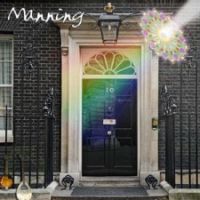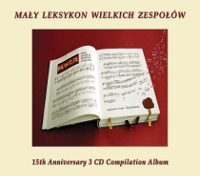 Number 10. It’s the tenth album of Manning formation. One has to admit that the multiinstrumentalist Guy Manning is an extraordinarily hard working musician, since the group, who he is the head of, release their albums very often (10 albums in ten years’ time!). This statistic make an impression, but here appears the question whether such a rarely occurring frequency of the releases doesn’t influence their quality in a negative way. The answer to this question may vary according to a listener’s approach. If he/she expects a good amount of music reminiscent of The Tangent’s work, then „Number Ten” would certainly meet his/her expectations. It’s worse if something new, original or suprising is expected. Then there may come a disappointment, because it seems that while releasing the album, Guy didn’t have enough time to introduce some more new elements to his music. Either way, it’s worth listening, because „Number Ten” is over 60 minutes of the melodic, ‘classical’ and, at many moments, very beautiful progressive rock.
Number 10. It’s the tenth album of Manning formation. One has to admit that the multiinstrumentalist Guy Manning is an extraordinarily hard working musician, since the group, who he is the head of, release their albums very often (10 albums in ten years’ time!). This statistic make an impression, but here appears the question whether such a rarely occurring frequency of the releases doesn’t influence their quality in a negative way. The answer to this question may vary according to a listener’s approach. If he/she expects a good amount of music reminiscent of The Tangent’s work, then „Number Ten” would certainly meet his/her expectations. It’s worse if something new, original or suprising is expected. Then there may come a disappointment, because it seems that while releasing the album, Guy didn’t have enough time to introduce some more new elements to his music. Either way, it’s worth listening, because „Number Ten” is over 60 minutes of the melodic, ‘classical’ and, at many moments, very beautiful progressive rock.
There are 8 tracks on the album:
Ships. Serene and dynamic composition for a start. What I liked best was the chorus and the subsequent “dialogue” between sax and keyboards (somewhere around the 2nd minute).
The Final Chapter. Dynamic intro turns into a toned down verse, in which in the foreground there is Guy Manning’s vocal, reinforced by a vast number of diverse sounds in the backgound. In the third minute, the voice gives way to instruments which “tell” the listener their own story. Indeed, the music on this album is unusually rich as far as the sound is concerned and it was prepared and recorded in the smallest detail and the thorough way.
An Ordinary Day. A wonderful recording. Subtle piano, pompous keyboard backgounds and a great vocal line make one want to come back to the composition, finding new interesting aspects every time.
Bloody Holiday. Here we come back to the „lively” sounds. The atmosphere is created by the “crazy” sax part and when in the third minute beautiful keyboards come into action, the mood of the song changes by 180 degrees.
Valentine’s Night. The first thing that catches the ear is the fact that Guy makes a vocal duet with Julie King, who brought in the song a lot of woman’s sensivity. The subtle sounds of the instruments emphasises the magical aura, which has been created by the vocalists. The final parts of the composition proves the fact that the participation of over 10 musicians in the recording of this album has reflection in the final effect – the flow and arrangements make a great impression.
A Road Less Travelled. It begins slowly and lazily, but it gathers momentum with every minute, enchating the listener with tiny details. The appearance of drums in the fourth minute adds some dynamism to those rich sounds. The improvised fragment in the sixth minute must be mentioned here. For the following minute it casts a spell on the listener. “A Road Less Travelled” is 10 minutes of the progressive food for thought.
Another Lazy Sunday. Waiting for the main course of the album, the listener is presented with another shorter and compact composition. However, it does not mean that “Another Lazy Sunday” is a simple song. Nothing of this sort. In the third minute, the musicians give vent to their imagination and take us on a real „space ride” extravaganza.
The House On The Hill. A great final of “Number Ten” is a 15-minute suite, which includes a number of both tempo and mood changes, thanks to which there can be no question of boredom. Delicate and serene fragments intertwine with more dynamic ones, giving an overview of what Manning’s music of 2009 sounds like. Each of the instrumentalists has enough space to present his talent. “The House On The Hill” will be a great musical feast to all fans of the prog rock of the 70s.
„Number Ten” won’t disappoint fans of Guy Manning’s work, because it maintains the high standard of the preceding releases of this talented composer, bringing in some new elements. There is no revolution though. Whether it’s good or not, everyone must answer for themselves. The album is rather for the classic prog rock conservatists, the ones who look for experiments have rather nothing to look for on this CD. Maybe the next disc will bring some changes? We shall see. And for the time being, I suggest that everyone should form their own opinion on “Number Ten”.
Translated by Katarzyna Chachlowska






